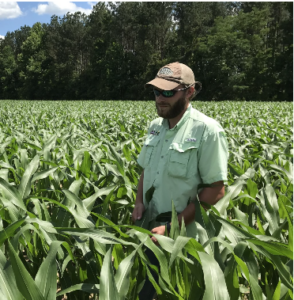Project Title: Corn Verification Program
PI’s: Erick Larson, Angus Catchot, Tom Allen, and Drew Gholson
Dept: PSS & BCH/EPP

Project Summary
Corn production is a growing integral component of Mississippi’s agricultural economy as it has become the second or third most popular row crop based upon acreage and value during the past ten years. This indicates there is tremendous potential to improve our management systems. Thus, Mississippi State University Extension has established a Corn Verification Program supported by the Mississippi Corn Promotion Board using your checkoff funds. The Corn Verification Program is a multi-disciplinary outreach program that identifies limitations and integrates research findings into better, more profitable corn production systems. Both these program priorities are essential to the outcome derived from implementing state of the art technology and the quality of research Mississippi State University produces. Our foremost objective is to increase profitability of Mississippi’s corn production systems, using innovative, sound principles and technology which are proven or have practical merit. This mission is achieved through methods distinct to an outreach demonstration program. We rely upon cooperation with growers who afford us management responsibility of one field in order to employ improved practices and assess limitations on their farms. Through weekly field evaluation of grower cooperators’ fields, we monitor crop response and identify vital issues capable of improving crop productivity or reducing risk. This not only allows us to pinpoint limitations and efficiently address them, but also provides critical direction for future research projects and continuous development and improvement of management systems. In summary, we develop and apply innovative, science-based management solutions to directly address cropping limitations and demonstrate value. There is no stronger tool to encourage adoption of better practices than successful demonstration in the field.
Project Results
Our experience with Mississippi growers and Corn Verification Fields has identified three fundamental management topics which principally establish corn yield potential and affect profitability: hybrid selection, stand development, and plant nutrition. Specific limiting factors normally differ by farm, but this program gives us tremendous insight from which we can improve corn research and educational efforts. Our climate presents unique challenges which cause substantial issues with several key topics for southern corn growers. Abundant rainfall commonly presents intrinsic problems for corn planting and stand development in the Midsouth. Abundant spring moisture not only restricts and delays corn planting, but also increases stand failure, growth disparity and soil compaction, which substantially reduce yield. Thus, we promote planting guidelines based upon favorable soil temperature and moisture, rather than relying solely on historical weather data or calendar date. New efforts are focusing upon methods to improve corn stand uniformity and vigor, including refining raised bed preparation and seeding depth.

Our experience has also shown tremendous opportunity exists to improve corn profitability through better soil-water management. We work closely with our irrigation team and have found a vast majority of corn growers apply far more irrigation than necessary. This can lead to incessant soil saturation, which has negative impacts on corn growth and development. Thus, we have integrated new technology with crop needs to develop innovative irrigation guidelines which dramatically reduce expenses and enhance productivity. Additionally, wet soils restrict plant nutrition by promoting nitrogen loss, and create soil compaction during various field operations, which restricts root growth. Accordingly, we tailor nitrogen fertility programs to ensure fertilizer sources are applied using suitable methods and timing capable of improving crop availability and reducing loss for both irrigated and dryland production systems. Crop nutrient needs also continue to change as yields rise, different crops are grown, and other conditions evolve. Lastly, the university serves a vital role of independently evaluating corn hybrids. We analyze Hybrid Trials and coordinate an on-farm Hybrid Demonstration Program designed to supplement yield data and thoroughly evaluate characteristics of the market’s premier hybrids, so we can recommend better hybrids for specific culture. In summary, these farm-based activities allow us to clearly assess our corn needs and better direct educational and research programs to enhance profitability for Mississippi corn producers.
Project Impact / Benefits
The Corn Verification Program provides first-hand opportunity to identify many factors limiting corn productivity, so that we can develop educational programs and collaborate with scientists and industry to better direct research to address pertinent limitations in our region. Numerous findings documented through this program have developed into major Mississippi State University research projects, which train graduate students and thoroughly investigate limitations. Furthermore, there is no stronger tool to encourage adoption of new technology and better practices than successful demonstration in the field. Our efforts have addressed many corn production limitations for Mississippi corn producers. This has increased Mississippi corn productivity at rates far surpassing the national average. For example, our recent efforts have helped increase corn yields up to 25 bu/a compared to our cooperator’s, while reducing irrigation water consumption and expense over 40%. These benefits alone increase grower profitability nearly $200 per acre. We believe the cumulative adoption of progressive practices identified, developed and demonstrated through this program offer tremendous possibility to enhance our systems and reduce risk. These activities substantially improve profitability and sustainability of growing corn in Mississippi.
Project Deliverables
- 36 Professional presentations, field days, workshops and other MSU Extension programs in 2022
- 37 Published activities on the Mississippi Crop Situation Blog and Mississippi Crop Situation Podcast in 2022
- 24 MSU Extension, MAFES, trade magazine and popular press publications in 2022
- 158 Publications on social media (Twitter and Instagram) creating 198,660 impressions and 2898 followers in 2022
- 185 Field visits and consultations associated with this program in 2022
